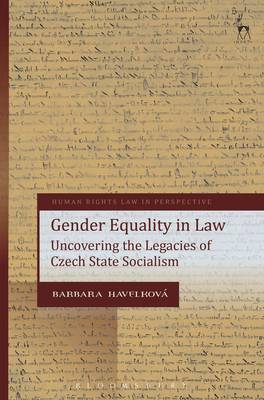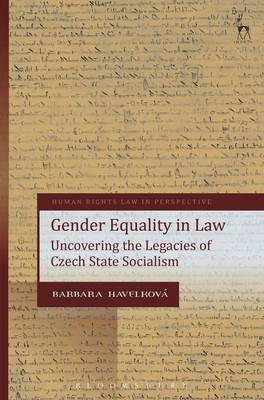
- Retrait gratuit dans votre magasin Club
- 7.000.000 titres dans notre catalogue
- Payer en toute sécurité
- Toujours un magasin près de chez vous
- Retrait gratuit dans votre magasin Club
- 7.000.0000 titres dans notre catalogue
- Payer en toute sécurité
- Toujours un magasin près de chez vous
220,45 €
+ 440 points
Format
Description
"In Gender Equality in Law: Uncovering the Legacies of Czech State Socialism, Barbara Havelková offers a sober and sophisticated socio-legal account of gender equality law in Czechia. Tracing gender equality norms from their origins under state socialism, Havelková shows how the dominant understanding of the differences between women and men as natural and innate combined with a post-socialist understanding of rights as freedom to shape the views of key Czech legal actors and to thwart the transformative potential of EU sex discrimination law. Havelková's compelling feminist legal genealogy of gender equality in Czechia illuminates the path dependency of gender norms and the antipathy to substantive gender equality that is common among the formerly state-socialist countries of Central and Eastern Europe. Her deft analysis of the relationship between gender and legal norms is especially relevant today as the legitimacy of gender equality laws is increasingly precarious."
Professor Judy Fudge, Kent Law School
Gender equality law in Czechia, as in other parts of post-socialist Central and Eastern Europe, is facing serious challenges. When obliged to adopt, interpret and apply anti-discrimination law as a condition of membership of the EU, Czech legislators and judges have repeatedly expressed hostility and demonstrated a fundamental lack of understanding of key ideas underpinning it. This important new study explores this scepticism to gender equality law, examining it with reference to legal and socio-legal developments that started in the state-socialist past and that remain relevant today.
The book examines legal developments in gender-relevant areas, most importantly in equality and anti-discrimination law. But it goes further, shedding light on the underlying understandings of key concepts such as women, gender, equality, discrimination and rights. In so doing, it shows the fundamental intellectual and conceptual difficulties faced by gender equality law in Czechia. These include an essentialist understanding of differences between men and women, a notion that equality and anti-discrimination law is incompatible with freedom, and a perception that existing laws are objective and neutral, while any new gender-progressive regulation of social relations is an unacceptable interference with the 'natural social order'. Timely and provocative, this book will be required reading for all scholars of equality and gender and the law.
Professor Judy Fudge, Kent Law School
Gender equality law in Czechia, as in other parts of post-socialist Central and Eastern Europe, is facing serious challenges. When obliged to adopt, interpret and apply anti-discrimination law as a condition of membership of the EU, Czech legislators and judges have repeatedly expressed hostility and demonstrated a fundamental lack of understanding of key ideas underpinning it. This important new study explores this scepticism to gender equality law, examining it with reference to legal and socio-legal developments that started in the state-socialist past and that remain relevant today.
The book examines legal developments in gender-relevant areas, most importantly in equality and anti-discrimination law. But it goes further, shedding light on the underlying understandings of key concepts such as women, gender, equality, discrimination and rights. In so doing, it shows the fundamental intellectual and conceptual difficulties faced by gender equality law in Czechia. These include an essentialist understanding of differences between men and women, a notion that equality and anti-discrimination law is incompatible with freedom, and a perception that existing laws are objective and neutral, while any new gender-progressive regulation of social relations is an unacceptable interference with the 'natural social order'. Timely and provocative, this book will be required reading for all scholars of equality and gender and the law.
Spécifications
Parties prenantes
- Auteur(s) :
- Editeur:
Contenu
- Nombre de pages :
- 368
- Langue:
- Anglais
- Collection :
- Tome:
- n° 22
Caractéristiques
- EAN:
- 9781509905867
- Date de parution :
- 01-06-17
- Format:
- Livre relié
- Format numérique:
- Genaaid
- Dimensions :
- 155 mm x 234 mm
- Poids :
- 675 g

Les avis
Nous publions uniquement les avis qui respectent les conditions requises. Consultez nos conditions pour les avis.






